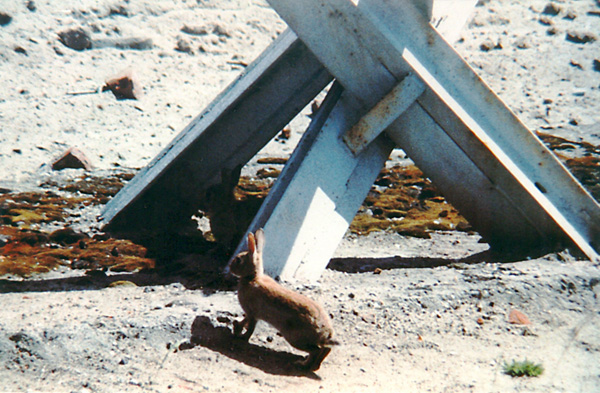|
Reviews of Recent Independent, Foreign, & Documentary Films in Theaters and DVD/Home Video

RABBIT
À LA BERLIN Reflections on post-World War II Germany and Poland tie together two short documentaries—the first a tongue-in-cheek allegory, the other a Freudian rumination. Rabbit à la Berlin, nominated last year for the short documentary Academy Award, got my vote on my home Oscar ballot. Creatively using the format of the animal parable, like Aesop’s Fables or George Orwell’s Animal Farm, Polish director Bartek Konopka tracks a certain segment of Berliners—rabbits—living in the city’s center from 1945 and on. After scrambling for food in the wartime rubble, they were encircled by the Berlin Wall in 1961, and for the next 28 years, they inhabited the 150-kilometer “Death Zone” boundary. In his very original approach to history that is as thought provoking as it is amusing, Konopka mischievously cites March of the Penguins (2005) as an influence. The droll tone of satirist Michał Ogórek’s narration, which comes through even over the subtitles, blithely purports to be a nature documentary even as it anthropomorphizes politics from the rabbits’ point of view of life in a protected socialist paradise without predators. Famous visitors on both sides of the wall, including JFK, Khrushchev, and Castro, seem to be waving at the rabbits. Not just cute conformists, a few daring rabbits tunnel from their burrows to the other side to feast on tourist leavings (following the examples of the humans seen being chased and attacked). After a period of coexistence with bemused guards, these escapes bring about a crackdown: the wall expands from simple barbed wire surrounded by green grass to a grimmer and more extensive moat. Even poisonings are carried out. Konopka also cites Woody Allen’s Zelig (1983), and it does sometimes feel that he’s teasing the audience with faux footage, and not just because the on-screen rabbit burrows are actually from other countries. The artists, who talk about using the rabbits as symbols of freedom in the 1970s, seem almost too earnestly Monty-Pythonesque. But the interviews with an evolutionary biologist, who studied wild rabbit behavior in Germany, and former East German border guards are genuine. And then comes 1989 and the openings in the wall that first a few and then more rabbits (and people) clamor through. Subsequent newspaper headlines decry a plague of wild rabbits overrunning West Germany, a surprisingly realistic metaphor both for East Germans grappling with new freedoms and West Germans struggling with reunification. Loss takes the talking-heads approach to studying a different gap in German history, and is less effective. After an opening quote from Freud, Hannah Arendt, seen in a 1964 interview with Günter Grass, recalls how she felt most betrayed by the intellectuals who went along with the shunning of German Jews, like her family, during the early rise of the Nazis. Director Nurith Aviv, whose family also fled Germany, then interviews a range of intellectuals born in the 1940s about what it was like to grow up and study in a region that was silent about its Jewish heritage. A professor
of physics says it took a year abroad at an American university to learn
about German Jewish scientists. One psychoanalyst laments on how slow
the German branch of the profession was to recover from its perceived
Jewish Freudian taint, and actor
Hanns Zischler speaks about Germans missing out on the humor and
vitality of Jewish culture. They sound more disingenuous than
insightful, though, especially when every German Jew I’ve met who fled
was in mourning from being cut off from the richness of pre-war German
intellectual traditions.
Nora Lee Mandel
|

